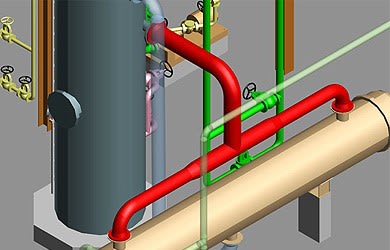ren65
Automotive
- Oct 10, 2005
- 3
Hello, longtime reader first time caller =)
Does anyone have a link where i can get the definitive answer to how automotive turbos work especially regarding enthalpy, gas expansion, pressure differentials etc. a more advanced explanation would greatly help. An ongoing discussion Im on, on another forum are debating the importance of heat versus pressure. I' know they're inter related but others differ.
There's an adamant poster there who repeatedly states that heat is not important in spinning a turbo and the following are examples of his rants:
Quote: They have test rigs for testing turbos and colder air has been used in the past without being heated like exhaust is and the result is the turbine does more work on the compressor because at the same flow rate the gas is heavier or denser and has and can transfer even more energy to the turbine than the hotter but less dense true exhaust flow would."
Quote:
I can tell you the that the turbo is a big pinwheel with no direct heat conversion for sure as anyone knows that works with them.
Quote:
There is no direct heat conversion in a turbo that makes boost. If you apply the same pressure drop on the turbo with cold air you will have even more mass flow on the compressor side since the turbo will not be as hot.
Quote:
The colder charge striking the turbine blades would have more energy because it would have more mass traveling at the same speed striking the wheel.
Quote:
The turbo will work quite well with hot or cold gas pressure across it. The pressure drop is what is important and NOT the heat.
And Ive replied with this:
Erik,
Got tech to back this up, link maybe? I find this highly suspect. This goes against all I've read about gas turbines. Are these cold air driven turbo test rigs located in the same factory that rotors with cast-in holes can be found?
Ive been taught ambient or cold air will not spin an automotive turbine to the supersonic impeller speeds needed to create boost in an automotive application more efficiently than hot gasses. Please prove me wrong because I'm about to buy a couple of high cfm Sears gas blowers to hook up to some twin turbos.
and
Erik,
The reason I'm still beating this horse is because heat is just as important as pressure when it comes to spinning the turbine. By saying that a cooler pressure will spin the turbine faster is flat out wrong and ignores entirely the function of enthalpy in an automotive turbo system.
A car turbo shares little resemblance to a pinwheel, water wheel, water pump etc. since these systems do not rely on expanding gasses for efficiency. I understand when you state that cooler air will always be denser than a hotter one (true) and I understand how you and Matt can mistakenly apply this to pressure in a turbo system and I complete disagree.
Im sticking with my guns and stating that a cooler charge WILL NOT make an automotive turbo impeller spin faster than a hot one and nothing you have provided has backed this up. I've read and reread the 5+ pages in this thread and its still not clear to me that you understand how enthalpy plays a great role when you post things like this, you keep repeating things that's simply not true when it comes to automotive turbines.This is the main beef I have with your explanations and I'd hate for anyone else to think it as fact.
Please give me a name or number where you are getting this tech, if I've missed it please repeat it.
Who's right, and can anyone explain in both laymans terms and a scientific explanation on who is wrong and why?
Sorry for the long post but its been a week long discussion and both camps have not come to a conclusion. The guy says he has a Physics and an engineering background.
Thanks for your time
Does anyone have a link where i can get the definitive answer to how automotive turbos work especially regarding enthalpy, gas expansion, pressure differentials etc. a more advanced explanation would greatly help. An ongoing discussion Im on, on another forum are debating the importance of heat versus pressure. I' know they're inter related but others differ.
There's an adamant poster there who repeatedly states that heat is not important in spinning a turbo and the following are examples of his rants:
Quote: They have test rigs for testing turbos and colder air has been used in the past without being heated like exhaust is and the result is the turbine does more work on the compressor because at the same flow rate the gas is heavier or denser and has and can transfer even more energy to the turbine than the hotter but less dense true exhaust flow would."
Quote:
I can tell you the that the turbo is a big pinwheel with no direct heat conversion for sure as anyone knows that works with them.
Quote:
There is no direct heat conversion in a turbo that makes boost. If you apply the same pressure drop on the turbo with cold air you will have even more mass flow on the compressor side since the turbo will not be as hot.
Quote:
The colder charge striking the turbine blades would have more energy because it would have more mass traveling at the same speed striking the wheel.
Quote:
The turbo will work quite well with hot or cold gas pressure across it. The pressure drop is what is important and NOT the heat.
And Ive replied with this:
Erik,
Got tech to back this up, link maybe? I find this highly suspect. This goes against all I've read about gas turbines. Are these cold air driven turbo test rigs located in the same factory that rotors with cast-in holes can be found?
Ive been taught ambient or cold air will not spin an automotive turbine to the supersonic impeller speeds needed to create boost in an automotive application more efficiently than hot gasses. Please prove me wrong because I'm about to buy a couple of high cfm Sears gas blowers to hook up to some twin turbos.
and
Erik,
The reason I'm still beating this horse is because heat is just as important as pressure when it comes to spinning the turbine. By saying that a cooler pressure will spin the turbine faster is flat out wrong and ignores entirely the function of enthalpy in an automotive turbo system.
A car turbo shares little resemblance to a pinwheel, water wheel, water pump etc. since these systems do not rely on expanding gasses for efficiency. I understand when you state that cooler air will always be denser than a hotter one (true) and I understand how you and Matt can mistakenly apply this to pressure in a turbo system and I complete disagree.
Im sticking with my guns and stating that a cooler charge WILL NOT make an automotive turbo impeller spin faster than a hot one and nothing you have provided has backed this up. I've read and reread the 5+ pages in this thread and its still not clear to me that you understand how enthalpy plays a great role when you post things like this, you keep repeating things that's simply not true when it comes to automotive turbines.This is the main beef I have with your explanations and I'd hate for anyone else to think it as fact.
Please give me a name or number where you are getting this tech, if I've missed it please repeat it.
Who's right, and can anyone explain in both laymans terms and a scientific explanation on who is wrong and why?
Sorry for the long post but its been a week long discussion and both camps have not come to a conclusion. The guy says he has a Physics and an engineering background.
Thanks for your time




